SEDBERGH SCHOOL ARCHIVES
(Courtesy of Sedbergh School Archive and Heritage Centre)
SEDBERGH SCHOOL REGISTER 1910
1198 – Turner, George Corrall: (School-house), son of J. Turner, Ilkley; born September 27th, 1884; left July, 1901. Great War:– Capt., West Yorkshire Regt.; France 1915-1917; killed in action September 13th, 1917.
‘The Westmorland Gazette’ (27 October 1917)
(Kindly supplied by Sedbergh & District History Society)
[Heading of article not known but does exist]
TURNER, Capt. G.C., West Yorks. Regt., has been killed in action. He was educated at Sedbergh and Leeds University, and for three years he was with Messrs. Gilkes and Co., Kendal. He was an active member of the Lake District Fell and Rock Climbing Club. He then went abroad and spent several years in Canada and British Columbia. He joined the Leeds University O.T.C., and later took a commission with the West Yorks. Regiment. He was killed whilst leading his men in an attack on September 13th. His age was 32. His Colonel in a letter to his home at Ilkley spoke in high terms of the courage, perseverance and endurance of Capt. Turner. The writer added “His company was holding the front line, and the enemy placed an intense barrage on the battalion front. Your son did magnificent work, as he always has done, and went from post to post for nearly an hour under very severe fire. A little before 5 a.m. the enemy attacked in force, and it was very greatly due to the splendid example your son has always set and to the perfect courage and coolness shown by him last night, that his company successfully repelled the attack and inflicted heavy casualties on the enemy. He was killed instantaneously by a shell, just after leaving a post where he had been leading a hand to hand fight. Your son was mentioned the other day in divisional orders for gallantry and devotion to duty.”
SEDBERGH SCHOOL ARCHIVES
(Courtesy of Sedbergh School Archive and Heritage Centre)
The Sedberghian, VOL. XXXVIII. NO. 5. NOVEMBER, 1917 – Obituary Notes.
G.C. TURNER
Capt., West Yorkshire Regt.
(Killed in action, Sept. 13th, 1917).
George Corrall Turner was at School House from 1900 to 1901, and afterwards at Leeds University. He was an engineer by profession, first at Kendal and then for three years in British Columbia. When war broke out he joined the Leeds University O.T.C. and received his commission in the West Yorkshire Regt. in February, 1915. He was killed in action on Sept. 13th at the age of 32.
In the following extract from Divisional Orders which has been sent to us he is mentioned “For most conspicuous courage, self sacrifice and devotion to duty on the morning of Sept. 13th, when his company was holding the line in front of R–t [Riencourt].
At 4 a.m. the enemy placed a heavy barrage of all calibres, artillery and trench mortars, on his front. Capt. Turner at once rushed up to No. 1 Post in the Apex, and, shewing a complete disregard for his personal safety, he mounted the parapet and walked continuously from post to post, thus making sure that all fire steps were manned, until he was struck by a trench mortar and killed shortly before 5 a.m. Possessed of excellent judgment, he must have realised fully that under the circumstances it was hardly possible for him to survive, but he went wherever the shelling was hottest, and in the words of his Second-in-Command ‘made the weakest into heroes’ by the force of his example and perfect courage and coolness. He was in all ways the best Company Commander I have known, and I have no doubt that it was entirely due to his example and to the standard he set to his officers and men that the enemy’s raid was completely repulsed.” A very fine tribute to a brave Sedberghian.
HISTORY OF THE 2/6TH BATTALION WEST YORKSHIRE REGIMENT
[The following extract describes a German raid on the trenches held by the 2/6th Bn. West Yorkshire Regiment in retaliation for a successful raid that the battalion had carried out previously.]
At 4 a.m. on the morning of the 13th there was a fierce bombardment of our trenches lasting till 5-15 a.m., and under cover of the barrage the enemy raided the apex which B Coy., commanded by Capt. G.C. Turner, was holding. We will quote in full from a letter written by Col. C.H. Hoare to Col. Hastings immediately after the event:–
“Early in the morning of the 13th after an intense bombardment lasting for an hour the Boches tried to raid us. His party consisted of fifty storm troops, fifty infantry of the line, and thirty sappers with two officers. They had orders to destroy all dug-outs on the apex, and to mop up the garrison. B Coy. was holding the line, and did quite splendidly. Turner went up and down his posts, and saw that all parapets were manned, and was killed just before the Boches tried to come in. I cannot say how much I regret his loss. I tried to get him a V.C., having previously tried for the M.C., in each case without success. But he inspired his whole company. They fought like heroes, with the result that the Boches did no good at all. One officer – a gallant fellow – was killed in a post, and three men, also in posts. Three unwounded and one wounded prisoner, and one of the prisoners told us that he had dressed thirteen wounded men on the extreme right flank of the attack, and that there were many killed. The Lewis gunners were quite splendid. Two guns fired over 1,200 rounds each, though every man in action was either killed or wounded. Of course, we had casualties, but really it was a splendid performance, and we have had congratulations from the Army Commander.”
Our casualties were unfortunately heavy, Capt. Turner killed, ten other ranks killed, twenty-seven wounded and four missing, but our men had repulsed the enemy at all points with great loss. Capt. Turner, as we read in Col. Hoare’s letter was recommended for the V.C., and all who fought with him on that day with one voice declare that he, if anyone, was worthy of it. However, the higher authorities thought fit to refuse it, and this fine officer, owing to the regulation that only the V.C. can be posthumously awarded, finished his Army career without a decoration of any kind. Many a time by his devotion to duty he had richly deserved some recognition, but he was of so modest a nature that he always refused to be in the limelight. He was certainly the most impressive officer the battalion ever had, and we do not think we should be exaggerating if we were to substitute British Army for battalion. Nobody ever heard him boast, nobody ever heard him say an unnecessary word; he was in truth a strong, silent man, and he was loved and trusted by all. We felt we had been privileged to know him so intimately, and we longed to fashion ourselves on his noble plan. He disliked war intensely, but he valued his duty more than any personal like or dislike. We must quote a passage from the letter to his parents by Colonel Hoare.
“His company was holding the front line, and at four o’clock this morning the enemy placed an intense barrage on the battalion front.
“Your son did magnificent work, as he always has done, and went from post to post for nearly an hour, under continuous and very severe shell and trench mortar fire. A little before five o’clock the enemy attacked in force, and it was greatly due to the splendid example your son always set, and to the perfect courage and coolness shown by him last night, that his company successfully repelled the attack, and inflicted heavy casualties on the enemy. He was killed instantaneously by a shell just after leaving a post where he had been leading a hand to hand fight.
“I have not been very long with the battalion, but have seen a good deal of your son, and shall miss him more than I can say. He was an ideal company commander, full of resource, energy and courage, always certain to carry out any duty, no matter how difficult or dangerous. His men loved him, and my greatest sorrow is that he did not live to see how his company profited last night by his training and example.
“I have never met anyone in whom I had more perfect confidence, nor for whom I formed a greater liking, and can never hope to get so good a company commander.
“You probably know that your son was mentioned the other day in divisional orders for gallantry and devotion to duty.”
DE RUVIGNY'S ROLL OF HONOUR 1914-1918 – Part Five
TURNER, GEORGE CORRALL, Capt., 2/6th (Territorial) Battn. The Prince of Wales’s Own (West Yorkshire Regt.), yr. s. of John Turner, of Newlands, Ilkley, by his wife, Sabina, dau of John Chester Cravence, of Brighton; b. Ilkley, co. York, 27 Sept. 1884; educ. Grammar School there, Sedbergh, and Leeds University; was a Civil Engineer, and had spent three years in British Columbia; joined the Leeds University O.T.C. on the outbreak of war in Aug. 1914; gazetted 2nd Lieut. 2/6th West Yorkshire Regt. in Feb. 1915; served with the Expeditionary Force in France from 7 Jan. 1917, and was killed in action at Riencour 13 Sept. following. Buried in Favreuil Military Cemetery, near Bapaume. His Commanding Officer wrote: “His company was holding the front line, and at 4 o’clock this morning the enemy placed an intense barrage on the battalion front. Your son did magnificent work, as he always has done, and went from post to post for nearly an hour under continuous and very severe shell and trench-mortar fire. A little before 5 o’clock the enemy attacked in force, and it was very greatly due to the splendid example your son has always set, and to the perfect courage and coolness shown by him last night, that his company successfully repelled the attack and inflicted heavy casualties on the enemy. He was killed instantaneous by a shell, just after leaving a post, where he had been leading a hand-to-hand fight. I have not been very long with the battalion, but have seen a good deal of your son, and shall miss him more than I can say. He was an ideal Company Commander, full of resource, energy and courage, always certain to carry out any duty, no matter how difficult or dangerous. . . . His men loved him.”
England & Wales, National Probate Calendar (Index of Wills and Administrations), 1858-1966
1917
TURNER George Corrall of Newlands Ilkley Yorkshire captain 2/6th battalion P.W.O. West Yorkshire regiment died 13 September 1917 in France Administration London 27 December to John Turner retired yarn agent. Effects £1325 18s. 5d.
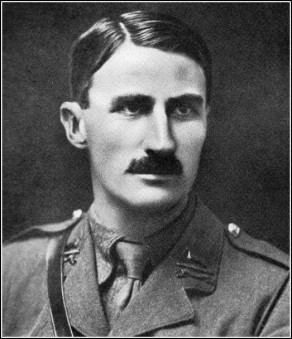
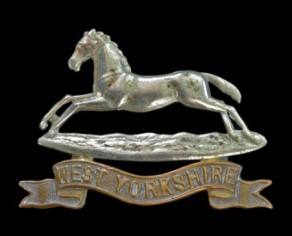
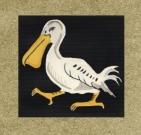

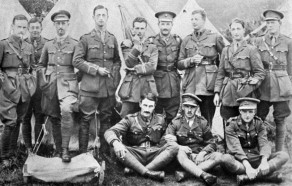
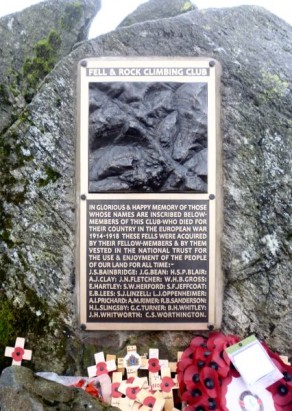
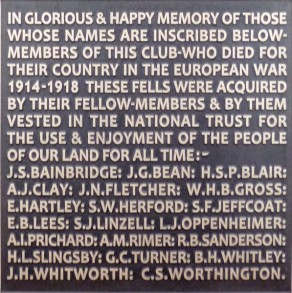




No comments yet.